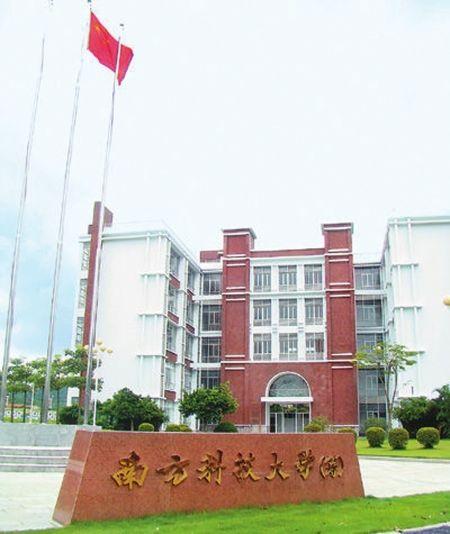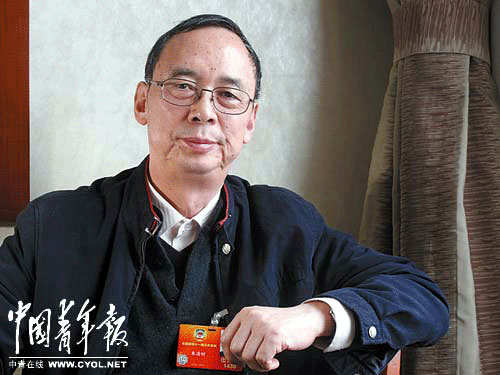Higher education outside the box
- By Zhang Rui
 0 Comment(s)
0 Comment(s) Print
Print E-mail China.org.cn, March 7, 2012
E-mail China.org.cn, March 7, 2012
|
|
|
Zhu Qingshi, the?President of?the South University of Science and Technology of China [China.org.cn] |
A controversial new university may recruit 200 more students if China's education ministry approves it, the school president said.
The South University of Science and Technology of China (SUSTC), a university that hopes to begin a revolution in Chinese higher education, was evaluated by Guangdong's education department in February, and will face a final evaluation by the Ministry of Education in the near future.
Zhu Qingshi, the university's president and member of the National Committee of the Chinese People's Political Consultative Conference (CPPCC) which convenes in Beijing for annual sessions, told China News Service on March 3 that if the education ministry finally approves the university's official launch, they will at most only enroll 200 new students due to the unfinished campus.
The SUSTC, based in Shenzhen, Guangdong Province, aims to break free from the traditions and formalities of the country's educational system – such as a national entrance exam for students or administrative ranks for professors – and focus instead on creativity and thinking outside the box. The founders hoped to build a top university similar to the California Institute of Technology and Rockefeller University, which are small but very elite.
"We all hope there are new students coming this fall," Zhu said, and added that he is waiting for the education ministry's approval, which will give him the qualification to recruit students nationwide. He was not sure if the national college entrance exam should be a necessity until he receives notice from the ministry.
According to related regulations, a new university must undergo years of examinations from education authorities before it can gain the right to grant bachelor's degrees and master's degrees. As a result, the new university will grant its own academic diplomas, which come with no guarantee that they will be recognized by the government.
Without official diplomas, graduates of the university will not be able to apply for postgraduate projects in China's public-funded institutions, and will also be treated differently by the country's social insurance system.
Zhu Qingshi, 66, admitted to China Youth Daily that he had experienced "the toughest year ever" in his life.
After serving as head of the University of Science and Technology of China for 10 years, the academic chemist retired and wanted to study ancient pottery in the Forbidden City Museum. But he was invited by the Shenzhen government in 2009 to found an innovative university, and he thought "this may be the most interesting thing I have come across in my life."
SUSTC, still under construction – scheduled to open in June 2012 – received its first batch of 45 students at a temporary campus last March without the education ministry's approval. The students did not take the national entrance exams required by the Ministry of Education, skipping the final year in high-school that they would have spent preparing for them, causing huge controversies at the time. The project has received a mixed reception and has been criticized by academics from other universities.
Last June, Professors Li Xiaoyuan, Li Zexiang and Li Jianshu from Hong Kong University of Science and Technology (HKUST)?who helped Zhu with building the new university, announced their departure from SUSTC because of differences of opinion with Zhu on how to run it. Their joint statement said Zhu lavished attention on many "specious slogans" without looking into how to improve the quality of professors, education and management system, as well as having no clear future plan, goal or roadmap for the school.
They accused Zhu of following only his own ideas, and disregarding the students' needs. "The university cannot say it is revolutionary because it is not putting a robust system in place," they added.
 |
|
The campus of??the South University of Science and Technology of China [File photo] |
But Zhu Qingshi still insisted on finding the educational talents first, then designing the roadmap and program plans for the university.
Since then Zhu became unusually silent, no longer the outspoken man he once was. "Do you know why?" he said, "We were at a critical point. We sailed into deep water, but the boat may be overturned." Zhu said at that time, Shenzhen's authorities and public didn't have much confidence in the future of SUSTC.
But Zhu went through the most difficult time and started to restore both confidence and image. "Currently we are in the start-up phase; our initial plan is to build a top class research-oriented university. When we build everything and prepare everything, software or hardware, then we will recruit."
Zhu said he might make some compromises, but not the "fundamental ones." Zhu plans to enroll students and asks them to take the national college entrance exam. But he stressed that the national exam should not be a necessity. SUSTC will still primarily recruit students according to their own standards.
In the past half-year, Zhu said SUSTC has selected from more than 8,000 applicants from all over the world and hired – in a very low key – the first batch of 60 leading teachers, including 48 professors and 12 guest professors from Hong Kong and Shenzhen. Zhu also invited five top international academics to form the first advisor committee, including Henry T. Yang, a professor of mechanical engineering and the chancellor of University of California, Santa Barbara.
"We are walking out of the downturn. The structure of the university is building up," Zhu said.
Zhu Qingshi said the most difficult thing is how to achieve his concept of de-bureaucratization within the institutions of higher education, i.e., to remove the administrative levels of universities and their officials so that scientists and scholars would have more power and freedom within the spheres of their research. Currently, the Chinese government is heavily involved in national universities' management, and many university officials and professors have government official ranks, which implies that many teachers want to receive an official post rather than achieve high academic results.
From the beginning, SUSTC has tried to avoid government influence. However, half of the members of the college board are city officials. But thus far, civil servants still hesitate to send their CVs for management posts. "Their political future is not guaranteed for them in this university."
Zhu Qingshi said the appeals of reform in various sectors of China are echoed by the central government, but the reforms in certain areas still linger. He has asked for de-bureaucratization for years and received no support, but now this term has finally been written in a national long and mid-term education reform and development guideline. He said that he now realizes that de-bureaucratization is a gradual step-by-step process, and he wrongfully and over-optimistically estimated the capacity for the reform.






